Syria Says Israel Attacked Targets With Surface-To-Surface Missiles

Syrian state media reported Wednesday that Israel attacked targets near Damascus using surface-to-surface missiles instead of warplanes it has usually used.

Syrian state media reported Wednesday that Israel attacked targets near Damascus using surface-to-surface missiles instead of warplanes it has usually used.
There are no details about what targets were hit, but past attacks have aimed at destroying weapons and ammunition depots belonging to Iran-backed forces. Also, weapons destined for the Lebanese Hezbollah have been a prime target for Israeli attacks in the past four year.
Israel does not comment about attacks in Syria.
Recent reports have said Iran is transferring surface-to-air missiles and attack drones to Syria, training militia forces under its command to use the drones. Last month, suspected Iranian drones hit a US base in southern Syria, in what could be seen as an escalation of Iranian sponsored attacks against US forces.
Israeli media say that the use of surface-to-surface missiles instead of aircraft could be a sign of an agreement with Russia not to expose the weakness of Russian air defense systems provided to Syria. The Russian air defense systems have not harmed or stopped Israeli air attacks since 2017.
The attack took place just after midnight, local time, but Syria has said another attack on Saturday was also conducted with surface-to-surface missiles.
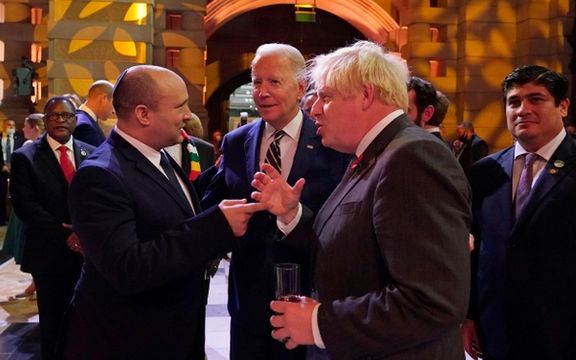
Israeli Prime Minister Naftali Bennett had meetings with world leaders in Glasgow, discussing Iran's nuclear issue, and advising them to be tough with Tehran.
Israeli media report quoting sources that Bennett had many productive meetings during the world climate summit in Glasgow, where other leaders were interested to know Israel’s opinion about how to deal with Iran and its analysis on Tehran’s intentions.
The Israeli prime minister had long talks with French President Emmanuel Macron and British Prime Minister Boris Johnson. The Times of Israel reported that discussions about Iran revolved two major issues – “what world powers can do to change Iranian behavior, and what Israel is doing independently.”
Iran suspended negotiations with world powers in June and has not returned to Vienna where six rounds of talks took place starting in April. Iran’s new hardline government is increasingly adopting a tougher posture that intends to change what was already agreed and perhaps even the established process whereby the United States was negotiation indirectly with the Iranian delegation.
A source told The Times of Israel that “There is a feeling in the world something has to happen,” and other countries want to know what Israel thinks.
Israeli media are also reporting that Bennet advised other leaders to be tough with Tehran, while most are thinking to use the traditional carrot and stick approach to coax Iran to play by diplomatic rules and reach an agreement on reestablishing limits to its nuclear program.
Meanwhile Bennett tried to solidify Israel’s strengthening ties with regional and Asian countries. He accepted an invitation to visit India and he invited Bahrain’s Salman Al Khalifa to visit Israel, an invitation he accepted.
Jerusalem Post reported that Bennett told world leaders to put more pressure on Iran, taking a hard line in the UN Security Council and in the International Atomic Energy Agency (IAEA).
Iran has reduced its cooperation with the UN nuclear watchdog this year but Western countries decided in the September meeting of the agency’s board of governors not to table a censure against Iran.
Bennett also reiterated Israel’s argument that without a firm plan to prevent Iran from obtaining nuclear weapons it would be a mistake to lift sanctions, giving Tehran a financial lifeline that it can use to finance its malign activities in the region.
US officials believe a drone attack in October on a US base in southern Syria was supported and “encouraged” by Iran, and last Friday the Treasury Department announced sanctions against Iranian officials and entities that assist its military drone program.
The Soufan Center, a counterterrorism and anti-extremism think tank reported on Tuesday that Iran is increasingly willing “to take direct military action against its adversaries” and force the US out of Iraq and Syria to be able to have free access for resupplying Hezbollah in Lebanon.
The report said, “It can be argued that the U.S. withdrawal from Afghanistan in August has led Iranian leaders to assess that direct U.S. military pressure can compel the United States to withdraw from the region completely.”
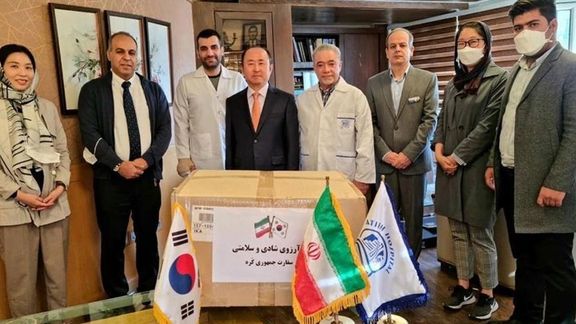
Iranian newspapers launched savage attacks Tuesday on the South Korean ambassador after he visited a private hospital Sunday and donated 2,000 Covid masks.
Javan newspaper affiliated to the Revolutionary Guards, called the ambassador Yun Kang-hyeon’s action “cheap and shameless” on its frontpage, reflecting anger at South Korean banks holding up billions in payments owed to Iran due to fear of punitive United States action.
The Persian word the paper used means 'rotten' or 'putrid'.
While several papers, and many prominent citizens, criticized Yun for insensitivity, Javan in a commentary condemned "a conspiracy" targeting the "honor of a nation." The newspaper insisted that "expulsion of the putrid ambassador of South Korea" would be an insufficient response to such "shamelessness."
"How many million dollars are you charging the Iranian people for each mask?" Javan asked.
Vatan-e Emrouz, another principlist newspaper, used a headline "Charity of Thieves" on its front page alongside a photograph of ambassador and a box of donated masks. Principlist media also slammed Atieh hospital, one of the most expensive private hospital in Tehran, for accepting the gift.
Two Korean banks are holding billions owed to Iran in payment for oil shipments supplied before United States president Donald Trump in May 2019 extended US threats to take action against any third party buying Iranian oil or dealing with its financial sector. South Korea stopped buying Iranian oil, and despite entreaties from Tehran has not released the assets.
Iran foreign ministry spokesman Saeed Khatibzadeh Monday called the donations of masks “a joke” and demanded South Korea unfreeze Iran's assets, which have been estimated at $7 billion.
Iran's foreign minister Hossein Amir-Abdollahian said October 2 that that the US should make a goodwill gesture − before talks resume to revive Iran’s 2015 nuclear deal, the Joint Comprehensive Plan of Action (JCPOA) – by ‘unfreezing’ $10 billion in Iranian funds. This amounted to a request for Washington to state it would take no punitive action against a named third party or parties transferring money owed to Tehran, which could include payments owed by South Korea.
In a tweet Monday, the South Korean embassy listed its donations to Iran since the beginning of the Covid pandemic, including 1 million doses of AstraZeneca in October, 1 million masks in June, PCR test kits worth $2 million in May, and $1 million-worth of medicine for rare medical conditions in February 2020.
Jamshid Barzgar, a London-based journalist, said all the criticism of the South Korean ambassador was “populistic” and motivated simply by wanting to have Iran’s assets unfrozen. He told Iran International it was “selective” to ignore Korea’s recent donation of 1 million vaccine doses and “blow up out of proportion” the 2,000 masks.
After a letter from Iran's Supreme Leader Ali Khamenei September 6, President Ebrahim Raisi (Raeesi) instructed ministers not to allow imports from South Korea’s LG and Samsung. While Khamenei framed the letter as a way to boost local manufacturers, state media also described the move as a diplomatic message to South Korea.
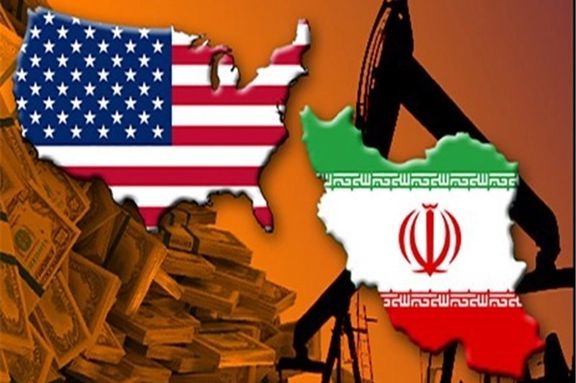
Iran’s government is pledging not to dip into the pockets of the central bank or print more money to balance its budget, but skeptics doubt there are any magic solutions to lack of income.
Iran’s budget deficit in the current fiscal year is 40-50 percent or around 5,000 trillion rials. If we convert the devalued rial amount to the highly appreciated dollar, it is around $20 billion. This would be a manageable amount if Iran could export 1.5 million barrels of crude oil daily, but currently it sells a few hundred thousand barrels at discounted prices.
According to estimates published by the parliament’s research center, only 15-20 percent of the projected oil revenues have been realized. The projection in the budget was to export 1.5 million barrels a day, which certainly was a gross overestimation, as US sanctions remained in place.
President Ebrahim Raisi’s ‘revolutionary’ government took office in August with pledges of solving the economic crisis, with his hardline supporters blaming the former administration for ineptitude. But it is common knowledge in Iran that the main cause for the steep economic decline since 2018 has been US sanctions, especially on its oil exports.
Then, why are the hardliners blaming Rouhani? The ruling elite headed by Supreme Leader Ali Khamenei does not want to admit that sanctions have caused misery. If they admit that, it means they must also admit that their confrontational foreign policy has led to economic disaster.
The Raisi government is now saying that they have found ways to generate income without borrowing from the central bank or printing money – although both mean the same thing, since the central bank has no extra foreign reserves. Former president Rouhani’s administration was printing money and fueling inflation that has reached close to 50 Percent. Absent a deal with the United States it had no other choice.
But few economists outside the government believe Raisi can magically generate revenues. Maysam Radpour, a well-known analyst in Iran was quoted by local media on Tuesday as expressing surprise that the government can find additional revenues without borrowing from the central bank or printing money. He said that neither expenditures have been cut nor tax collection increased, and US sanctions remain in place. He added that the government is muddling through amid a lack of real information about its actions.
The conservative website, Alef, published an analysis on the role of both sanctions and structural problems in generating Iran’s economic crisis. The article said that lifting sanctions is necessary for dealing with economic challenges but not sufficient without structural reforms.
Iran’s economy has many structural shortcomings and there is no choice but to do a “deep and painful surgery”, Alef said. It is an economy that has survived with injecting petrodollars to keep it going temporarily and when oil sanctions hit, it has no legs to stand on. If sanctions are lifted, economic conditions will somewhat improve the article said, but on the long-run “the reality of a sick economy will again impose its harsh impact on the country and on the people.”
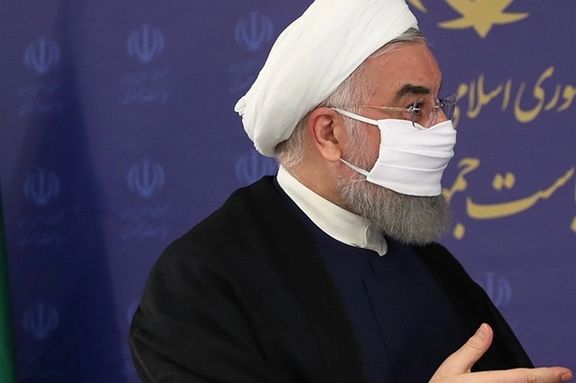
Iranian lawmakers agreed on Tuesday to send a report to the Judiciary on “Covid mismanagement” by former president Hassan Rouhani for possible legal action.
The parliament packed with hardliners was always critical of Rouhani in all aspects of governance and blamed him for the economic crisis gripping the country.
Rouhani’s defenders in the media have argued that United States sanctions are the main cause of the economic crisis and the country needed to resolve its differences over the nuclear issue with the West to be able to reduce inflation, raise wages and stimulate employment.
However, Iran’s major policy issues are decided by Supreme Leader Ali Khamenei and the president of the republic simply manages government operations.
The same applied to the Covid-19 pandemic when Khamenei banned the government from purchasing American and British vaccines in January, setting back the national vaccination plan for months.
Iran experienced a severe wave of the pandemic in July and August, with around 40,000 new deaths from June to mid-September. An increase in vaccinations since August has reduced the rate of new infections and deaths.
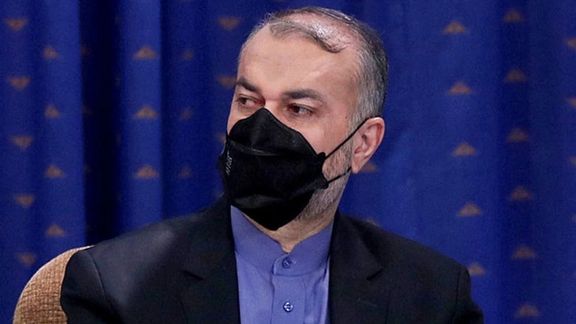
Iran’s Foreign Minister Hossein Amir-Abdollahian has tested positive for Covid-19, the foreign ministry's spokesman said late Monday.
"His general condition is good, and he continues working from quarantine," Saeed Khatibzadeh told state media late on Monday, adding that the minister's agenda of visits had changed.
The foreign minister of Iran does not take a direct part in negotiations over the resumption of the 2015 nuclear deal (JCPOA), which should resume by the end of this month, but Amir-Abdollahian has been active in shaping Iran’s negotiating position and has frequently commented on sensitive issues. It is not clear if his health can impact the resumption of talks.
Earlier on Monday, the foreign ministry announced that Amir-Abdollahian was going to India by the end of November to attend a meeting at the Indo-Iranian Joint Economic Commission.
No further indication was made by Khatibzadeh on whether the foreign minister would be able to go to New Delhi this month.